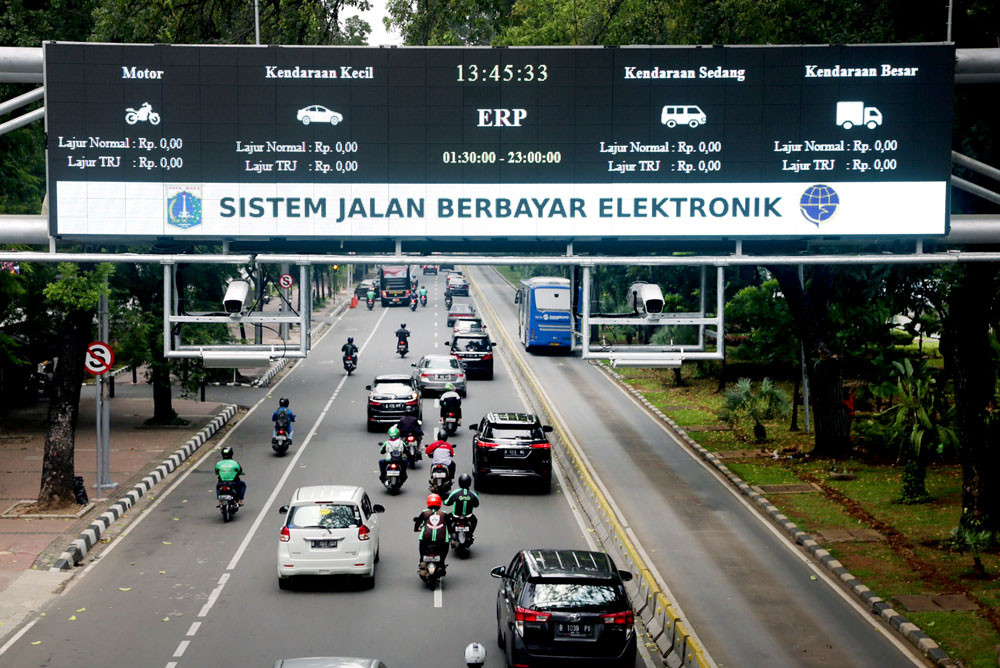Popular Reads
Top Results
Can't find what you're looking for?
View all search resultsPopular Reads
Top Results
Can't find what you're looking for?
View all search resultsOpinions divided over Jakarta’s electronic road pricing initiative
Change text size
Gift Premium Articles
to Anyone
T
he Jakarta administration’s plan to set up an electronic road pricing (ERP) system has elicited a mixed response, with observers unconvinced that it will provide an immediate solution to the capital’s snarled-up traffic, once more on the rise after offices began reopening at full capacity.
Reports first emerged earlier this month that the Jakarta Legislative Council (DPRD) aimed to finish deliberations with its executive counterparts to issue a regional regulation (perda) on the ERP by the end of this year.
The traffic control mechanism will force vehicle drivers to pay to pass through certain major thoroughfares in the capital at varying rates, in the hope of encouraging greater adoption of public transportation and thus reducing congestion.
And while the system might be a viable option for reducing traffic in general, transportation expert Djoko Setijowarno insists that policymakers should first improve the existing public transportation network, particularly for commuters from satellite cities going into the capital.
While most housing in Jakarta is situated within walking distance of some form of public transportation, including to the city-run Jaklingko angkot (minivans), most residential areas in the suburban sprawl, Djoko said, are still not readily connected to any public means of commuting.
Read also: Yearender 2022: Two steps forward, one step back for Jakarta public transportation
“[The ERP system] remains a problem for those living in the suburbs [of Bogor, Depok, Tangerang and Bekasi] but who have to work in Jakarta […] since public transportation services to and from Jakarta are still at a premium,” he stated on Wednesday.
Meanwhile, Etsa Amanda, senior associate at the Institute for Transportation and Development Policy (ITDP), suggested that the ERP would be effective if paired with the continuous development of the public transportation system.
On its own, however, the scheme did not constitute a “silver bullet” for fixing Jakarta’s traffic woes, she said.
Etsa likened continuous development as a pull factor, and disincentivizing private vehicles as a push factor. Both are important for the ERP to succeed.
“If there is no ‘push’ strategy whereby there are sufficient public transportation options, then the status quo will take hold in which congestion worsens and the public services on offer are not optimally utilized,” the analyst said on Thursday.
Ideal conditions
Jakarta’s current fixation with the ERP can be traced back to 2007, when then-governor Sutiyoso first considered adopting the system as an alternative to the largely unsuccessful “three-in-one” carpooling policy.
Read also: Despite numerous delays, ERP still feasible: Expert
Unlike previous leaders, however, interim governor Heru Budi Hartono’s lack of political baggage and expectations puts the seasoned city bureaucrat in a position to be the first person to finally put the ERP into motion, said Djoko.
“It takes a great deal of commitment to overcome Jakarta’s traffic jams by limiting the use of private vehicles,” the expert said. “ERP is a very unpopular policy […] So, only a governor who did not worry about his image would dare to implement it.”
Unpopular methods that discourage private transportation use will always meet some resistance, Etsa said.
“It’s not just the ERP, but [other] policies like increasing parking fees and developing pedestrian walkways are rarely supported right away. Similarly, the TransJakarta [bus rapid transit system] also faced pushback in the beginning, but is now a backbone of the capital’s transportation network,” she explained.
But despite the current buzz surrounding the ERP, city legislators say it is likely to take a while before the system will be truly implemented in the capital.
“[The regulatory framework] is still being deliberated at the Jakarta Council’s Legislative Body [Bapemperda],” said Ismail, chair of the council’s Commission B overseeing economic affairs, on Monday, as quoted by Kompas.com.
“If I’m not mistaken, the matter has only been discussed twice,” he said.
According to a current iteration of the draft regulation, the ERP system will charge cars and motorcycles that use any of Jakarta’s 25 main thoroughfares. The fare for driving along the Jl. Sudirman arterial route, which spans South and Central Jakarta, for instance, could range from Rp 5,000 (33 US cents) to Rp 19,000 for a one-way trip.
Based on such rates and Jakarta’s heavy traffic, Ismail said, the city administration stands to earn up to Rp 60 billion on a daily basis.
Besides transportation experts, the policy has also been met with resistance from end users, especially drivers whose livelihoods depend on earnings from ride-hailing services.
“If the system is applied the same to us as it will be to private vehicles, our earnings as online [taxi] drivers will automatically decrease drastically,” said Wiwit Sudarsono, secretary-general of the Rental Vehicle Association (PAS), as quoted by Tempo daily.










